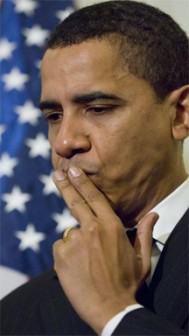WASHINGTON, (Reuters) – President Barack Obama yesterday announced a last-minute deal to raise the U.S. borrowing limit and urged lawmakers to “do the right thing” and approve the proposed agreement to avert a catastrophic default.

Laying out the endgame in the crisis just two days before a deadline to lift the U.S. debt ceiling, the White House and both Republican and Democratic leaders in Congress said the compromise would cut about $2.4 trillion from the deficit over the next 10 years.
Now that top lawmakers have sealed a deal, both the Senate and House of Representatives are expected to vote today. While Senate approval is likely, the agreement’s fate may be less certain in the House.
After weeks of acrimonious impasse and with the final outcome hinging on support from recalcitrant lawmakers, Obama pressured both sides to carry to fruition the accord hammered out behind closed doors.
“The leaders of both parties in both chambers have reached an agreement that will reduce the deficit and avoid default — a default that would have had a devastating effect on our economy,” Obama told reporters at the White House.
“I want to urge members of both parties to do the right thing and support this deal with your votes over the next few days,” Obama said.
The plan involved a two-step process for reducing the U.S. deficit. The first phase calls for about $900 billion in spending cuts over the next decade and the next $1.5 trillion in savings must be found by a special congressional committee.
Congress must act by Dec. 23, 2011, under the deal.
Republicans had insisted on deep spending cuts before they would consider raising the $14.3 trillion limit on U.S. borrowing, turning a normally routine legislative matter into a dangerous game of brinkmanship.
Financial markets showed immediate signs of relief after becoming unnerved in recent days as lawmakers neared an Aug. 2 deadline to raise the limit on America’s borrowing or risk the world’s largest economy running out of money to pay its bills.
The Japanese stock index rose 1.8 percent, U.S. stock futures built on earlier gains and the U.S. dollar rose modestly against the yen and the Swiss franc. Gold fell more than 1 percent, indicating investors had begun to shift out of safe havens.
“For the rally to be durable, markets will need more than this downpayment agreement,” said Mohamed El-Erian, co-chief investment officer at PIMCO, the world’s biggest bond fund.
“They will look to a more coherent fiscal reform to emerge from the second step and, more generally, for additional measures to remove structural impediments to growth and jobs,” he said.
While the deal means the United States is unlikely to default, it is far from certain whether the plan agreed by the White House and lawmakers goes far enough in reducing the deficit to appease credit ratings agency S&P, which has threatened to strip America of its top-notch AAA rating.
A deal would ease the immediate crisis but repercussions will be felt for years to come. Bitter brinkmanship has turned dysfunction seemingly into the norm in Washington, undercut America’s stature as the world’s capitalist superpower and set the stage for a deeply ideologically 2012 presidential race when Presi-dent Barack Obama is seeking re-election.
SELLING THE DEAL
Congressional leaders will now have to gauge whether they have the votes to pass the deal — which has sharp spending cuts and no new taxes — in the Senate and the House. In the house the political calculus is complicated by the entrenched opposition of some members affiliated with the conservative Tea Party movement.
House of Representatives Speak-er John Boehner, who will face opposition from those conservatives in his ranks, told Republicans he backed the accord but that it was not the “greatest deal in the world.” Already, some conservatives in his party said they would not sign on.
Democratic Leader Nancy Pelosi, a leading liberal considered crucial to delivering enough Democratic votes to offset Republican defections, suggested earlier that the terms under negotiation would be a tough sell in her party.
But in the Senate, passage appeared more certain.
“I am relieved to say that leaders from both parties have come together for the sake of our economy to reach a historic, bipartisan compromise,” Senate Democratic Leader Harry Reid said on the Senate floor.
Senate Republican Leader Mitch McConnell followed, saying: “We can assure the American people tonight that the United States of America will not for the first time in our history default on its obligations,” McConnell said.




